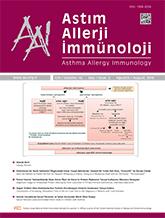


Objective: Cold urticaria is an uncommon type of physical urticaria. We aimed to characterize the features of patients with cold urticaria, and to investigate the effect of increasing stimulation time on the diagnostic value of the ice cube test.
Materials and Methods: Twenty-nine patients diagnosed with cold urticaria in the past three years were retrospectively included. Demographic and clinical data were collected. The ice cube test was performed in all patients. During the standard ice cube test procedure the stimulation time was five minutes, and if the result was negative it was gradually increased to ten and twenty minutes. To investigate the effect of increasing the stimulation time to twenty minutes on the diagnostic value, the test was performed in twenty patients with chronic urticaria in whom cold was not a triggering factor.
Results: Twenty-nine patients (F/M: 20/9, median (min-max) age:37 (17-57)) with cold urticaria were included. No secondary causes were identified. The rate of atopy was 48.0%. Three patients (10.3%) had localised cold urticaria. The frequency of systemic reactions and anaphylaxis was 48.0% and 10.3%, respectively. Twelve patients (41.4%) also had other types of urticaria, most commonly chronic spontaneous urticaria, and symptomatic dermographism. The sensitivity of the ice cube test was 58.6% when the stimulation time was five minutes and 69.0% when the stimulation time was gradually increased to twenty minutes. None of the controls showed positivity on the ice cube test with a stimulation time of twenty minutes.
Conclusion: Increasing the stimulation time during the ice cube test, when necessary, increases the sensitivity of the test and does not cause false positivity in patients with chronic urticaria in whom cold was not a triggering factor. Considering the high risk of systemic reactions and coexistence of other types of urticaria, cold as a triggering factor should be questioned in all patients with urticaria.